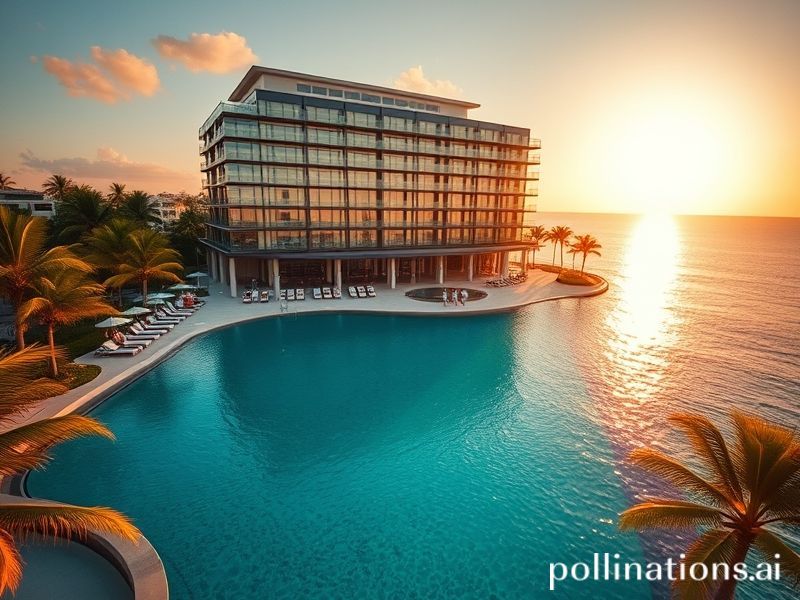Hotel Babylon: Inside the $1.5 Trillion Global Refuge From Reality
Hotel Babylon: A Global Tour of the Last Refuge Before the Apocalypse
By Your Correspondent, Fresh from the Minibar and Existential Dread
PARIS—At 2:14 a.m. in the Hôtel des Grands Boulevards, a Saudi prince is arguing with the night concierge about the ethical sourcing of his pillow mints. Three floors below, a climate-science post-doc from Lagos is live-tweeting the glacier she can no longer afford to study while charging the cost to an NSF grant that will expire with the ice itself. This, dear reader, is the modern hotel: a hermetically sealed UN General Assembly with softer towels and louder existential crises.
From Dubai’s 163-story tributes to architectural anxiety to a repurposed Bolivian salt-flat Airstream where Wi-Fi is a rumor whispered by alpacas, the planet’s 700,000-odd hotels have become the last neutral zones in an otherwise factionalized world. Inside, oligarchs, NGO field officers, and Instagram couples who’ve monetized their breakup all queue for the same rubberized omelets at dawn, united only by the shared delusion that someone else will clear away the consequences.
The industry now books $1.5 trillion a year—roughly the GDP of Australia, if Australia were a pop-up lobby bar serving flat prosecco to arms dealers. Chains like Marriott and Accor have more real-estate clout than most sovereign nations; their loyalty programs constitute the largest unregulated citizenship scheme since the British Empire. Collect enough points and you, too, can ascend from Silver to Gold to Platinum, finally achieving the mystical Black tier that entitles you to a slightly earlier checkout and the right to pretend none of this is happening.
Environmental optics, of course, are now as compulsory as towel origami. In Bali, bamboo eco-lodges brag about zero-carbon footprints while diesel generators hum discreetly behind the infinity pool. Meanwhile, Venice’s MOSE flood barriers—$6 billion and counting—protect the Gritti Palace from the very seas its imported truffles helped heat. Guests are encouraged to reuse linens “for the planet,” a gesture that saves roughly 0.0006% of the water required to irrigate the golf course carved into the desert next door.
Labor remains delightfully medieval. A housekeeper in Nairobi’s Hilton earns in a month what a hedge-fund bro tips the bartender for uncorking a Petrus he can’t pronounce. Yet the pandemic briefly flipped the script: when borders closed, the bellhops went home to farm kale, the influencers sobbed into ring lights, and hotels—those impregnable fortresses of global capital—were reduced to begging governments for bailouts like any other starving industry. The relief packages arrived just in time for occupancy rates to rebound alongside viral variants, proving that human resilience is best measured in revenue per available room.
Technology, ever the gracious host, now offers contactless everything. In Tokyo’s Henn na Hotel, animatronic velociraptors check you in with the dead-eyed enthusiasm of a TSA agent who’s seen your browser history. Seoul’s Yotel provides self-sanitizing rooms that emit UV light so aggressive guests emerge looking like bleached coral. And somewhere in Silicon Valley, a startup is prototyping an AI concierge that will listen to your 3 a.m. loneliness, suggest a craft gin, and then upsell you a timeshare in the metaverse before you can say “emotional damage.”
Yet for all the carbon offsets and robot dinosaurs, hotels endure because they sell the oldest narcotic: the illusion that you can pay to escape yourself. Whether it’s a capsule in Shinjuku or a tented suite in the Serengeti where zebras wander past your outdoor rain shower, the promise is the same: here, the world’s problems are optional add-ons, like breakfast. Check any dictionary and you’ll find “hospitality” rooted in the Latin hospes—both host and guest, but also hostage. The etymology checks out.
So the next time you swipe your key card at 3 a.m., remember you’re participating in the planet’s most successful multinational: a borderless archipelago of minibars, blackout curtains, and tiny shampoo bottles that somehow still smell like 1997. Outside, the ice caps shrug, currencies collapse, and democracy frays like a bathmat. Inside, the lobby playlist croons a bossa-nova cover of “Smells Like Teen Spirit,” and for one more night, the bar stays open later than the future.
Sweet dreams, global citizen. Checkout is at noon. The apocalypse may run late, but the late fee is still $50 an hour.







